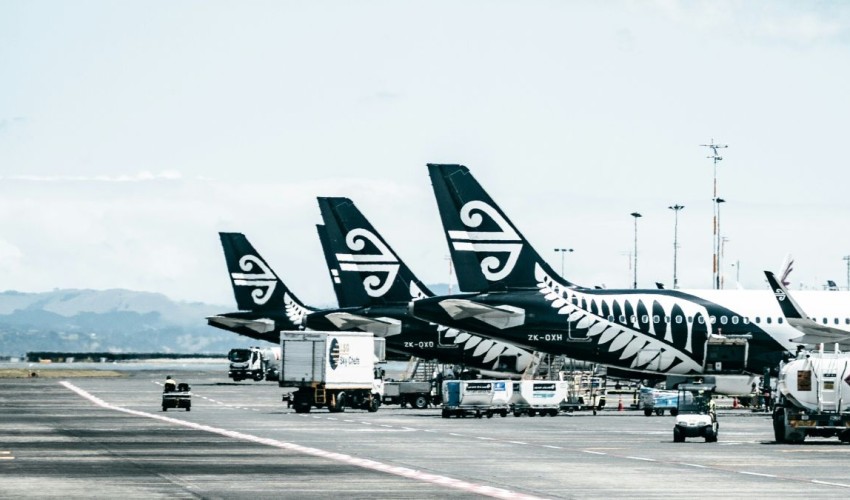Learn » Blog » Why Air New Zealand needs to stop overcharging us all
Why Air New Zealand needs to stop overcharging us all
Published on 23/11/2025
Topics:
kiwisaver

By Sam Stubbs. This article was originally written for The Post.
I fly a lot, and I’m proud of our national airline. Few nations are as defined by the experience of their national carrier than New Zealand, because many arrive here on their planes. The aircraft are - by and large - just fine, and the crew are exceptionally warm and friendly. When many tourists fly twelve hours to get here, you really notice it.
But lately something has been really annoying myself and other frequent flyers I know - the cost of domestic fares. If Air NZ wanted to maximise profits alone, it would do what it’s doing right now, and ramp up domestic fares, with pricing algorithms designed to maximise profits. And because international routes are very competitive, the domestic part of Air NZ usually subsidies the international one. So the temptation for them to charge locals as much as they can is strong.
Playing monopoly
Air NZ can do this easily, because on many routes they are the only choice. Jetstar offer some competition, but only on major domestic routes. So when we need to go to a funeral or be somwhere in the case of a crisis, very high fares can be really challenging. So it’s fair to ask, should Air NZ be only a for profit enterprise, and charge the highest fares it possibly can?
In one way, yes, because Air NZ is a listed company, and it has a fiduciary duty to maximise long-term profits for shareholders. And as it’s in the NZ Stock Exchange index (NZX 50), over three million KiwiSaver members will be shareholders too. But, unlike other listed and private companies, with Air NZ it’s not quite as simple as that.
Why? Well for one, Air NZ is 51% owned by the government - which means they are in charge of the company, whether they like it or not. So a fair question becomes: regardless of what the Air NZ Board might want, does the government want them to maximise profits, even if it means voters paying $460 for a one-way flight from Auckland to Wellington?
Leveraging their 'social license'
The second complication is that Air NZ has a 'social license to operate'. By that, I mean that it is free to make profits, but the government will never allow it to go bankrupt. In this sense, its profits are capitalised - but its losses socialised. The Covid-19 related bailout was the most recent example of this protection. Air NZ is like the banks - enjoying the protective blanket of the taxpayer any time things go badly wrong. So if it wants to take advantage of being a taxpayer-backed business - yet still feel free to maximise revenue at all times - Air NZ must expecso many of us are doing it especially tough.
The other complexity is that Air NZ effectively relies on the goodwill of loyal Kiwi travellers. The international travel market is very competitive, and Air NZ struggles to make money on international routes at the best of times. At the moment, many Air NZ planes are full purely because some are grounded with hard to solve engine issues. But once capacity comes back on, Air NZ will be relying on goodwill - and its friendly service - more than ever, especially as Qantas continues its march into our market. Air NZ should be rightly scared of a newly resurgent Qantas. During the same time period Air New Zealand brings on ten new aircraft to its fleet, Qantas will commission 100.
Strategic moves, gone wrong
Air NZ also needs to accept that its strategic focus on expanding its US routes has had (to put it lightly) mixed results. The number of times US destinations appear on the cover of Koru Magazine says to me that they are trying to fill up planes that are too often empty or seriously lacking. In expanding aggressively to the US instead of India and Asia, Air NZ has perhaps made a strategic mistake.
Air NZ will, of course, say it needs the extra profits. After a $146 million profit in 2024, and a drop to $126 million in 2025, the company is now forecasting a loss in the first half of next year due to softer bookings and higher engine leasing costs. But Air NZ has never been about maximising profit, and they have now gone - in my opinion - too far in continuing to charge egregious prices on domestic routes and justifying it with potential future losses. So softer bookings might just be price driven, as customers decide to fly Jetstar, or bite the bullet and take a big drive.
For the longest time, Kiwis have been loyal to Air NZ - in good times and bad. So when we are doing it particularly tough, Air NZ should not be demonstrating the same rent-seeking behaviours that the banks do, lest they become as unpopular. An endless media fascination with their press releases will not make up for sky high airfares.
The hard questions for the Air NZ Board
So, on behalf on consumers and shareholders, I think the Air NZ Board needs to be gently - or perhaps not so gently - reminded. Aim to make a profit? Of course, much good comes from that. But aim to make the highest profit at all times? Not if any short-term gain unfairly punishes the customers that loyally support you. The extra dollars you get from egregious domestic fares in the short-term may well hurt the long term customer goodwill you sorely need in the cutthroat world of international aviation.
The Board needs to consider - is this what your shareholders really want? The Minister of Finance, as the representative of the majority owner, may or may not be happy. But I am prepared to bet that many KiwiSaver members would rather see a very small reduction in their KiwiSaver fund returns, if it meant that fellow citizens didn’t feel stabbed in their wallet when needing to get to a funeral or loved one in need. In this sense, Air NZ needs to better serve the interests of its stakeholders, who are all New Zealanders.
Finding a fair balance
Our national airline is in a unique position. It is a company, utility, monopoly, and critical national asset. And it has a business and operating model that is, hands down, the most complex of all. But that means Air NZ is also good at observing and adapting to the competing interests of its many stakeholders. And in the case of domestic fares that are eye-watering at times, it needs to focus a little more on the ‘social’ and a little less on the ‘enterprise’.
Many are doing it tough right now, and Air NZ needs to give them a break. I suspect that, as both consumers and KiwiSaver owners of Air NZ shares, many would want that. I certainly do.


